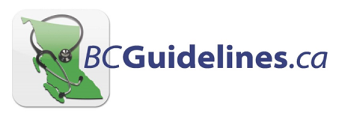Continuing Professional Development (CPD) Credits
Information for General Practitioners
Information for Specialists
Physicians are required to earn credits as part of their continuing medical education (CME) or continuing professional development (CPD) after graduation. Participating in CME or CPD helps physicians increase their current knowledge and skills in the medical field. Physicians can earn CME or CPD credits for working with BC Guidelines in a number of ways:
- Serving on the GPAC General and Executive committees;
- Serving on working groups that produce or revise BC Guidelines;
- Participating as external reviewers for new or revised BC Guidelines; and
- Reading and using BC Guidelines in practice.
General Practitioners
Update on Mainpro+® Credits for Family Physicians
Members of The College of Family Physicians of Canada (CFPC) may claim Mainpro+® credits for working with BC Guidelines. Mainpro+® credits are self-reported through the CFPC website.
Non-Certified Mainpro+® Credits
Members of the CFPC may earn non-certified Mainpro+® credits for working with BC Guidelines in a number of ways. For example:
- Serving on a GPAC committee or working group could count towards non-certified self-learning credit;
- Participating as an external reviewer for new or revised BC Guidelines could count towards non-certified assessment credit; and
- Self-studying BC Guidelines and resources could count towards non-certified self-learning credit.
Physicians may claim one non-certified credit for each hour that they spend in the above activities. There are no activity maximums for the self-learning or assessment credit categories.
See the Mainpro+® Activity Guide for further details: http://www.cfpc.ca/uploadedFiles/CPD/Mainpro_Grid_graphic_ver3.pdf
Certified Mainpro+® Credits through Linking Learning Activities
With the launch of Mainpro+®, physicians may earn five certified credits through the expanded Linking Learning exercises, which now include:
- Linking Learning to Administration
- Linking Learning to Research
- Linking Learning to Assessment
For example, reading a BC Guideline or acting as an external reviewer for a new or revised guideline could act as an assessment activity for a Linking Learning to Assessment exercise. There is no limit on the number of Linking Learning exercises that may be completed in a cycle.
For more information on Linking Learning exercises, see: http://www.cfpc.ca/Linking_Learning_exercises/
Specialists
Specialist physicians can earn continuing professional development credits through the Royal College of Physicians and Surgeons of Canada Maintenance of Certification (MOC) Program. In particular, specialist physicians can earn credit under Section 2: Self-learning for identifying learning related to writing, reviewing or reading clinical practice guidelines.
Participating in GPAC committees and working groups:
- Systems learning: Physicians can claim 20 credits per year for participating in activities or groups for the development of clinical practice guidelines.
- Systems learning: Physicians can claim 15 credits per year/per committee for participating in committees or working groups that aim to “improve or enhance the quality, safety, or effectiveness of the health care system.”
Acting as external reviewers:
- Systems learning: Physicians can earn 15 credits per year for peer review activities, including acting as an external reviewer for new and revised BC Guidelines.
Reading BC Guidelines:
- Scanning: Physicians can earn one credit per hour for bulk online reading or scanning of BC Guidelines using the Bulk Journal Reading Transcript, or individually (as reading a journal article) for one credit per guideline document read.
- Planned learning: Physicians can earn two credits per hour for personal learning projects—self-planned learning activities, developed to answer a question, issue, or problem a physician identifies in his or her professional practice. Learning stimulated through reading or reviewing BC Guidelines that is applicable to one's clinical practice could form the basis of a personal learning project.
These self-directed learning activities can be reported on The Royal College of Physicians and Surgeons of Canada's MAINPORT website.

